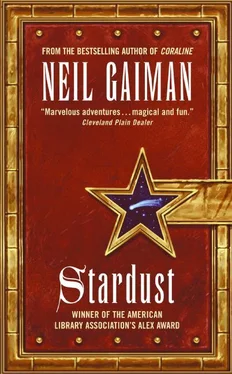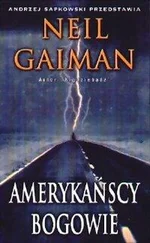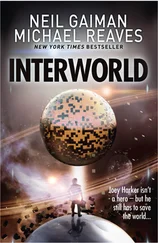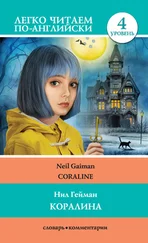With Tristran’s next step he was standing beside a lake, and the candlelight shone brightly on the water; and then he was walking through the mountains, through lonely crags, where the candlelight was reflected in the eyes of the creatures of the high snows; and then he was walking through the clouds, which, while not entirely substantial, still supported his weight in comfort; and then, holding tightly to his candle, he was underground, and the candlelight glinted back at him from the wet cave walls; now he was in the mountains once more; and then he was on a road through wild forest, and he glimpsed a chariot being pulled by two goats, being driven by a woman in a red dress who looked, for the glimpse he got of her, the way Boadicea was drawn in his history books; and another step and he was in a leafy glen, and he could hear the chuckle of water as it splashed and sang its way into a small brook.
He took another step, but he was still in the glen. There were high ferns, and elm trees, and foxgloves in abundance, and the moon had set in the sky. He held up the candle, looking for a fallen star, a rock, perhaps, or a jewel, but he saw nothing.
He heard something, though, under the babbling of the brook: a sniffling, and a swallowing. The sound of someone trying not to cry.
“Hello?” said Tristran.
The sniffling stopped. But Tristran was certain he could see a light beneath a hazel tree, and he walked toward it.
“Excuse me,” he said, hoping to pacify whoever was sitting beneath the hazel tree, and praying that it was not more of the little people who had stolen his hat. “I’m looking for a star.”
In reply, a clod of wet earth flew out from under the tree, hitting Tristran on the side of the face. It stung a little, and fragments of earth fell down his collar and under his clothes.
“I won’t hurt you,” he said, loudly.
This time, as another clod of earth came hurtling toward him, he ducked out of the way, and it smashed into an elm tree behind him. He walked forward.
“Go away,” said a voice, all raw and gulping, as if it had just been crying, “just go away and leave me alone.”
She was sprawled, awkwardly, beneath the hazel tree, and she gazed up at Tristran with a scowl of complete unfriendliness. She hefted another clod of mud at him, menacingly, but did not throw it.
Her eyes were red and raw. Her hair was so fair it was almost white, her dress was of blue silk which shimmered in the candlelight. She glittered as she sat there. “Please don’t throw any more mud at me,” pleaded Tristran. “Look. I didn’t mean to disturb you. It’s just there’s a star fallen somewhere around here, and I have to get it back before the candle burns out.”
“I broke my leg,” said the young lady.
“I’m sorry, of course,” said Tristran. “But the star.”
“I broke my leg,” she told him sadly, “when I fell.” And with that, she heaved her lump of mud at him. Glittering dust fell from her arm, as it moved.
The clod of mud hit Tristran in the chest.
“Go away,” she sobbed, burying her face in her arms. “Go away and leave me alone.”
“You’re the star,” said Tristran, comprehension dawning.
“And you’re a clodpoll,” said the girl, bitterly, “and a ninny, a numbskull, a lackwit and a coxcomb!”
“Yes,” said Tristran. “I suppose I am at that.” And with that he unwound one end of the silver chain, and slipped it around the girl’s slim wrist. He felt the loop of the chain tighten about his own.
She stared up at him, bitterly. “What,” she asked, in a voice that was suddenly beyond outrage, beyond hate, “do you think you are doing?”
“Taking you home with me,” said Tristran. “I made an oath.”
And at that the candle-stub guttered, violently, the last of the wick afloat in the pool of wax. For a moment the candle flame flared high, illuminating the glen, and the girl, and the chain, unbreakable, that ran from her wrist to his.
Then the candle went out.
Tristran stared at the star—at the girl—and, with all his might, managed to say nothing at all.
Can I get there by candlelight? he thought. There, and back again. But the candlelight was gone, and the village of Wall was six months’ hard travel from here.
“I just want you to know,” said the girl, coldly, “that whoever you are, and whatever you intend with me, I shall give you no aid of any kind, nor shall I assist you, and I shall do whatever is in my power to frustrate your plans and devices.” And then she added, with feeling, “Idiot.”
“Mm,” said Tristran. “Can you walk?”
“No,” she said. “My leg’s broken. Are you deaf, as well as stupid?”
“Do your kind sleep?” he asked her.
“Of course. But not at night. At night, we shine.”
“Well,” he said, “I’m going to try to get some sleep. I can’t think of anything else to do. It’s been a long day for me, what with everything. And maybe you should try to sleep, too. We’ve got a long way to go.”
The sky was beginning to lighten. Tristran put his head on his leather bag in the glen, and did his best to ignore the insults and imprecations that came his way from the girl in the blue dress at the end of the chain.
He wondered what the little hairy man would do, when Tristran did not return.
He wondered what Victoria Forester was doing at the moment, and decided that she was probably asleep, in her bed, in her bedroom, in her father’s farmhouse.
He wondered whether six months was a long walk, and what they would eat on the way.
He wondered what stars ate…
And then he was asleep.
“Dunderhead. Bumpkin. Dolt,” said the star.
And then she sighed, and made herself as comfortable as she could, under the circumstances. The pain from her leg
was dull but continual. She tested the chain about her wrist, but it was tight and fast, and she could neither slip from it nor break it. “Cretinous, verminous oaf,” she muttered. And then she, too, slept.
Chapter Five
in Which There is Much Fighting for the Crown
In the morning’s bright light the young lady seemed more human and less ethereal. She had said nothing since Tristran had woken.
He took his knife and cut a fallen treebranch into a Y-shaped crutch while she sat beneath a sycamore tree and glared at him and glowered at him and scowled at him from her place on the ground. He peeled the bark from a green branch and wound it around the upper fork of the Y.
They had had no breakfast yet, and Tristran was ravenous; his stomach rumbled as he worked. The star had said nothing about being hungry. Then again, she had done nothing at all but look at him, first reproachfully, and then with undisguised hatred.
He pulled the bark tight, then looped it under itself and tugged on it once more. “This is honestly nothing personal,” he said, to the woman and to the grove. With the full sunlight shining down she scarcely glittered at all, save for where the darkest shadows touched her.
The star ran one pale forefinger up and down the silver chain that went between them, tracing the line of it about her slim wrist, and made no reply.
“I did it for love,” he continued. “And you really are my only hope. Her name—that is, the name of my love—is Victoria. Victoria Forester. And she is the prettiest, wisest, sweetest girl in the whole wide world.”
The girl broke her silence with a snort of derision. “And this wise, sweet creature sent you here to torture me?” she said.
“Well, not exactly. You see, she promised me anything I desired—be it her hand in marriage or her lips to kiss—were I to bring her the star that we saw fall the night before last. I had thought,” he confessed, “that a fallen star would probably look like a diamond or a rock. I certainly wasn’t expecting a lady.”
Читать дальше








